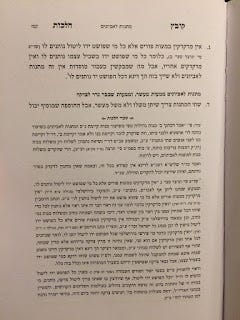Purim Piracy?

Purim, and the days preceding it, is a time when many institutions launch special fundraising efforts. I don't know that this is necessarily a bad thing, but in recent years I have had the uncomfortable feeling that this is a form of piracy. After all, it is not what the essential mitzva of Matanot L'Evyonim is all about. The mitzva is about helping the poor! Giving, and campaigning, for other causes, is taking money away from those who are supposed to be receiving it at this time.

I was pleased to discover that I am not the only person who thinks that way. Rabbi Gil Student pointed out that Rav Shmuel Kamenetzky, in his Kovetz Halachos, states this explicitly (see picture). He says that although on Purim there is a law that one should give to whoever stretches out their hand, this does not apply to those collecting on behalf of institutions, because that is not Matanot L'Evyonim.
In previous years I have posted about our amazing local yeshivah, Lev HaTorah. Instead of sending out its students to collect for the yeshivah, as most yeshivos do, it sends its students out collecting for a local charity organization, Lemaan Achai. (And that charity organization is itself a special one; its focus is on taking people out of poverty by providing all the resources and assistance necessarily for them to become financially independent.) One hopes that others will follow the example set by Lev HaTorah.

Giving to yeshivos is not the mitzvah of Matanot L'Evyonim. It distracts funds from it. But is there anything innately wrong with it? Yaffed, an advocacy organization seeking to improve secular education in the ultra-Orthodox community in the US, is launching a campaign arguing that there might be, for certain yeshivos that do not provide secular education. The angle in their graphic (pictured here) is that providing a secular education is the law of the land, and Dina d'malchusa dina.
However, on their Facebook page, they present what I think is a much more powerful argument. They write that "Philanthropists have a moral responsibility to ensure their money doesn't enable depriving kids of an education and raising a generation of people who will not have the skills to earn a living and provide for their families." To put it another way: Matanot L'Evyonim is about alleviating poverty, not enabling it.
At a broader level, this raises what I find to be a troubling aspect about applying the maxim of Kol haposhet yad, notnim lo in today's world. For most of our history, being a "charity case" was regarded as a shameful thing, and a failure to succeed in applying Chazal's values. Nowadays, however, nishtaneh hateva. There has been a reversal of values, and many people see it as admirable rather than shameful to avoid working and getting an education that enables one to earn a living. Would Chazal have been encouraging of people giving out money blindly in such a milieu? One can only wonder.


